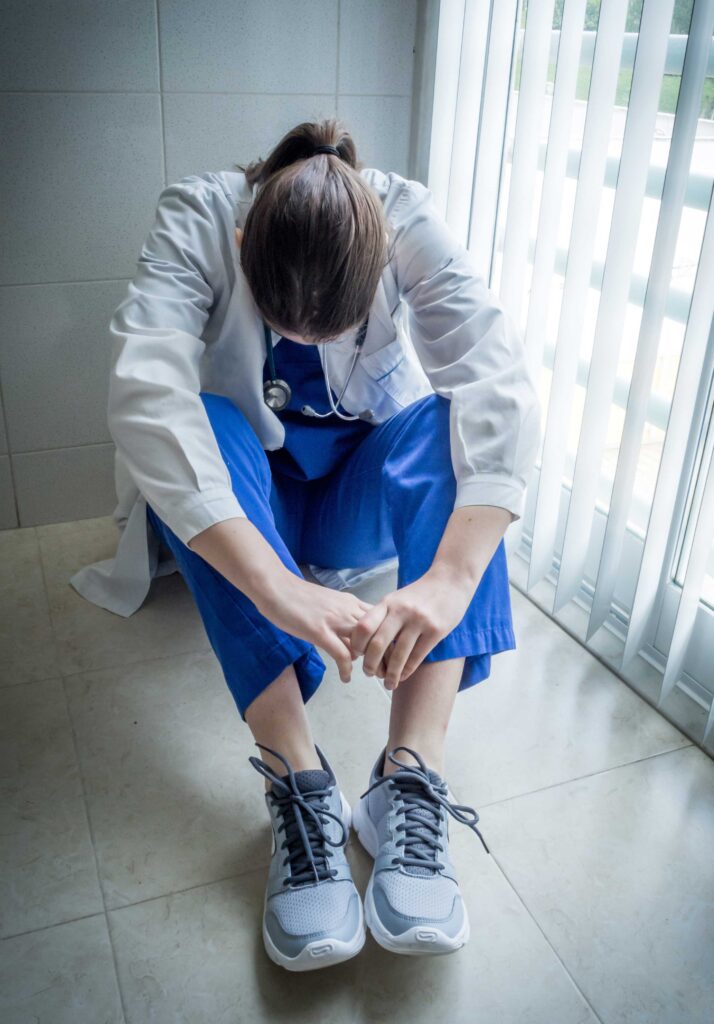
How our system hurts medical workers and how universal health care could help
Burnout, workforce distress, moral injury: These terms have different shades of meaning but all point to a growing crisis in medical workers, many of whom are experiencing exhaustion, depression, anxiety, and unbearable physical and emotional stress due to the demands of their work.
Many factors contribute to this crisis, but a big on is the corporatization of our health care system over the past several decades, with an increasing focus on maximizing profit and revenue that overshadows caring for patients. The physicians, nurses, and other health care workers who care for us are caught in the middle, having in most cases chosen their work to help and heal people but finding it harder and harder to do so because of the business demands imposed on them.
This crisis has been building for years. It predates Covid-19, but the pandemic has exacerbated it. Dr. Phil Caper, a retired internist and founding board member of Maine AllCare, wrote about the industrialization of medicine and how patients have become “consumers,” and physicians have become “providers” in an opinion piece in the Bangor Daily News in 2015 that, sadly, is still relevant today. In fact, the problem has gotten worse, not better.
Identifying the problem
Burnout has been defined as “mental and physical exhaustion from chronic workplace stress” and can cause people to shut down emotionally and impair relationships with family and friends as well as impact work productivity and quality.
Moral injury goes further, describing the experience of “perpetrating, failing to prevent, bearing witness to, or learning about acts that transgress deeply held moral beliefs and expectations.” In our profit-driven health care system, health care workers are pressured to meet business demands that often conflict with or undermine what they know patients need.
The stories are heart-rending: In a recent episode of On Point, physicians and other health care workers talk about how moral injury affects them, in some cases to the point of leaving a profession they love, or feeling deeply conflicted about encouraging their children’s interest in medicine. Nurses talk about their often harrowing and painful experiences in a video published by The New York Times last January, “We Know the Real Cause of Crisis in Our Hospital: It’s Greed.” An emergency room physician details how new “triage” models in ERs “boost profits but compromise care.”
‘More yoga’ isn’t going to cut it: Systemic change is needed
As this crisis gets more attention and recognition, the response often focuses on individual actions that health care workers can take to help themselves and build resilience–practice yoga, meditate, talk with friends, etc. Some researchers, policymakers, and advocates are working to shift the focus to the systemic changes that are really needed.
Still, few voices are talking about how universal health care, single payer, Medicare for All could be part of the solution.
How could universal health care help?

In a universal, publicly funded system, health care would be treated as a public good rather than a profit center. Administrative complexity would be greatly reduced in a simplified system of funding and payment. Health care professionals could focus on taking care of people rather than on endless administrative tasks and bolstering the bottom line for shareholders.
We can choose to pay attention and respond to the crisis among health care workers, on whom we all rely, and demand the systemic change that we need to return health care to the business of caring for people rather than the business of making money.
It’s worth noting that physicians and other health care workers suffer the effects of burnout and moral injury, and also have a responsibility to advocate for change. “Doctors can no longer be passive witnesses to these harms. We have a responsibility to use our collective power to insist on changes: universal health care and paid sick leave but also investments in community health worker programs and essential housing and social welfare systems,” writes Dr. Eric Reinhart in a February 2023 essay in The New York Times.
Organizations like Physicians for a National Health Program are one avenue for health care workers to stand up for putting people before profits. Maine AllCare (we’re also a PNHP chapter) was largely founded and has been guided by practicing and retired physicians who bring their experience, expertise, and desire to heal to our system of medicine as well as to individuals.
Maine AllCare has formed a Google Group for health care practitioners interested in health care reform. If you are interested in joining, please contact Dan Bryant.
What’s happening in Maine:
Numbers rise for healthcare professionals entering substance abuse and mental health program (Maine Monitor, July 2022)
UMaine system to help prevent burnout in medical workers (Portland Press Herald, January 2022)
A doctor shortage is expected to get worse. Here’s what it means for patients (NewsCenter Maine, March 20223)
Further reading and listening:
An Arm and a Leg: One ER Doctor Grapples With the Inequities of American Health Care (Podcast, July 2022)
Minnesota Nurses Fear for the Future of Health Care (April 2023)
A Conversation With Doctors Who Support Universal Health Care (April 2023)
Featuring Dr. Eric Reinhart and Dr. Susan Rogers, immediate past president of Physicians for a National Health Program

